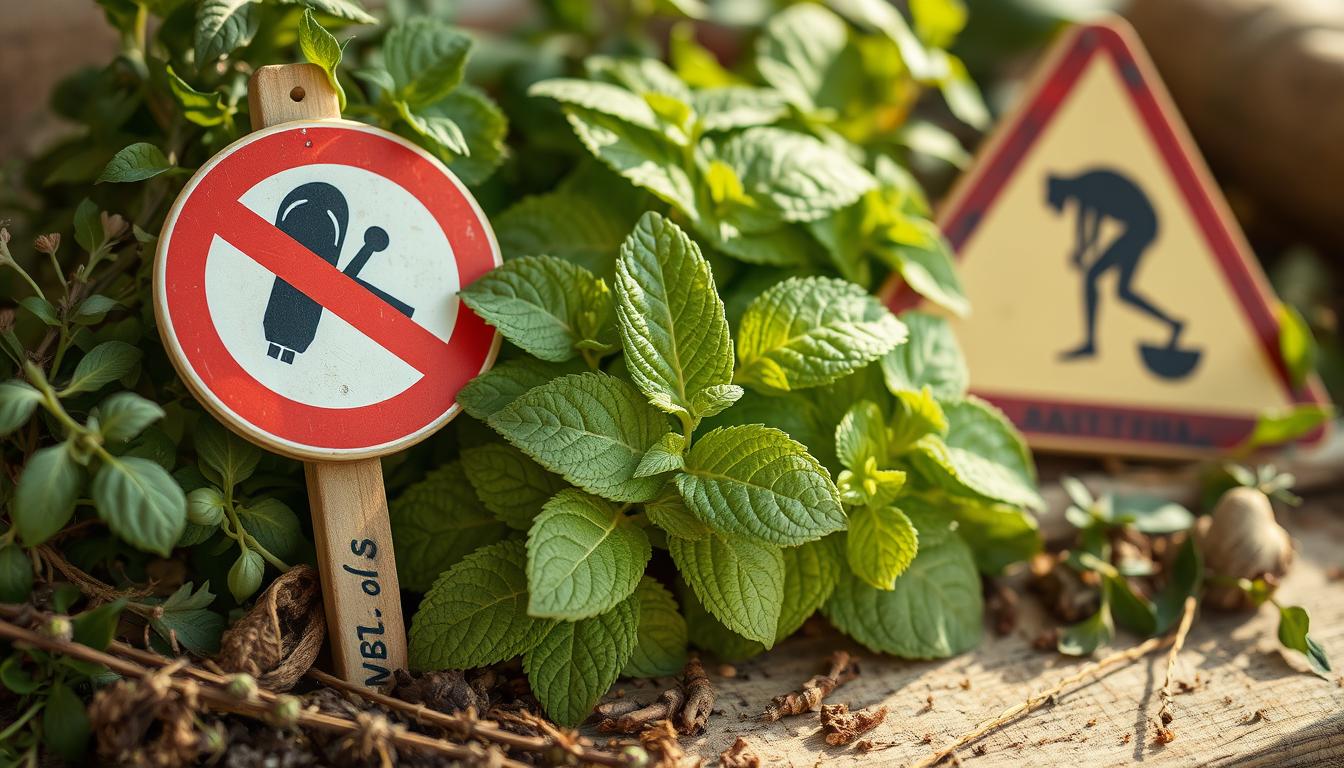Ever wondered if that herbal remedy could hide risks? Lemon balm, a popular natural supplement, isn’t for everyone. While many enjoy its health benefits, some should use it with caution.
It’s important to know the safety precautions for lemon balm. Not everyone can safely use it, and knowing who to avoid it can prevent problems. Your health journey needs careful steps, including when trying natural remedies.
Lemon balm can have risks, more than you might think. Certain health issues, medications, and sensitivities can make it risky. Who should not take lemon balm? Let’s look at the key things to consider for your health.
Experts with over 18 years of experience stress the need for personalized advice. Every person’s health is different, making general advice risky. Before adding lemon balm to your routine, talking to a healthcare professional is key.
Your safety is the most important thing. This guide will help you understand the key precautions for lemon balm. Knowing the facts is powerful for your health and well-being.
Jump to
Understanding Lemon Balm and Its Uses
Explore the world of Melissa officinalis, a powerful herb loved by natural health fans for ages. Lemon balm, with its bright green leaves and citrusy smell, is packed with health perks. It can change your wellness routine for the better.

What is Lemon Balm?
Lemon balm belongs to the mint family, known for its lemony scent and strong health benefits. Melissa officinalis is found in Europe and the Mediterranean. It has been valued for thousands of years for its uses in food and medicine.
Common Health Benefits of Lemon Balm
Lemon balm is more than just a tasty herb. It has many health benefits:
- Reduces anxiety and promotes calmness
- Improves sleep quality
- Supports cognitive function
- Provides antiviral protection
“Lemon balm may help decrease anxiety in stressed individuals, with studies showing significant improvements in mental well-being.” – Natural Health Research Institute
Studies show lemon balm’s amazing benefits. One study found that people taking 500 mg of lemon balm leaves three times a day saw:
- 54% better sleep quality
- 49% less anxiety
- Better brain function
The herb’s compounds, like rosmarinic acid and citral, make it very useful. It helps with heart health and may fight oxidative stress. This makes lemon balm very interesting to researchers and health experts.
Allergies and Sensitivities to Lemon Balm
Lemon balm can cause unexpected allergic reactions in some people. It’s important to know about lemon balm sensitivities. While many enjoy this herb, some may have adverse reactions that need attention.

Identifying Allergic Reactions
Lemon balm allergies can show up in different ways, mainly in those sensitive to mint family plants. If you’re allergic to herbs like basil, sage, or oregano, you might be more likely to react to lemon balm.
- Skin reactions including redness and itching
- Respiratory difficulties
- Digestive system disruptions
Symptoms to Watch For
Spotting lemon balm allergies early is key to avoiding serious health issues. Look out for these common signs:
| Symptom Category | Specific Manifestations |
|---|---|
| Skin Reactions | Hives, rashes, contact dermatitis |
| Respiratory Signs | Wheezing, shortness of breath |
| Digestive Indicators | Nausea, stomach pain, vomiting |
Severe allergic reactions can potentially lead to anaphylaxis, a life-threatening condition requiring immediate medical intervention.
“Understanding your body’s response to lemon balm is key to preventing possible allergic episodes.”
If you notice unusual symptoms after using lemon balm, stop right away and see a doctor. Skin prick tests and blood tests can help figure out if you’re allergic to lemon balm.
Cautions for Pregnant and Nursing Women
Using herbal supplements during pregnancy and breastfeeding needs careful thought. Lemon balm’s safety during these times is a topic of ongoing study. Healthcare experts advise a cautious approach.
It’s important to know the risks and benefits of lemon balm for pregnant and nursing women. While some herbal remedies can be helpful, lemon balm’s safety during pregnancy needs a detailed look.
Potential Risks During Pregnancy
Pregnant women should be very careful with lemon balm. There’s not enough research to say it’s completely safe during pregnancy. Important things to think about include:
- Lack of detailed studies on lemon balm’s effects during pregnancy
- Possible effects on hormonal systems
- Risk of unexpected body reactions
“Always consult your healthcare provider before introducing any herbal supplement during pregnancy.” – Maternal Health Experts
Recommendations for Nursing Mothers
Guidelines for nursing mothers using lemon balm need careful thought. Research shows it might affect milk production. Nursing mothers should be aware of this:
| Herbal Impact | Potential Effect on Milk Supply |
|---|---|
| Lemon Balm | Possible decrease in milk production when consumed in large amounts |
| Eugenol Compounds | May interfere with prolactin levels |
Important note: How herbal supplements affect people can differ a lot. Getting advice from a healthcare provider is the best way to know if lemon balm is safe for you.
Talking to a healthcare provider, lactation specialist, or obstetrician can help. They can give you advice tailored to your situation. This way, you can protect your health and that of your baby.
Interactions with Medications
It’s important to know about lemon balm drug interactions for your health. This herbal supplement has many benefits but can also affect medications. This can lead to unexpected problems.
Lemon balm and medications can have complex interactions. Always talk to your healthcare provider before using this supplement with prescription drugs.
Blood Thinners and Lemon Balm Risks
People taking blood thinners should be careful. Lemon balm can make these medications work too well. This might increase the risk of bleeding.
- Potential enhancement of blood-thinning medication effectiveness
- Increased risk of bruising or prolonged bleeding
- Recommended consultation with a medical professional
Antidepressants and Anxiety Medication Interactions
Lemon balm can also affect mental health medications. It might change how these drugs work.
“Always disclose all herbal supplements to your healthcare provider to ensure safe medication management.”
Potential interactions include:
- Increased sedative effects
- Potential reduction in medication effectiveness
- Unexpected changes in mood stabilization
When looking into herbal supplement interactions, getting professional advice is key. It helps keep you safe and ensures the best treatment.
Individuals with Thyroid Disorders
Thyroid health is complex. It’s important to know how herbal supplements like lemon balm affect it. If you have thyroid issues, be careful about interactions.
Lemon Balm’s Impact on Thyroid Function
Lemon balm can have complex effects on thyroid function, which is a concern for those with thyroid conditions. Studies show it might lower thyroid hormone levels. This is a big worry for people with hypothyroidism.
- Potential reduction in thyroid hormone production
- Possible interference with thyroid medication absorption
- Risk of altering thyroid function
Recommendations for Thyroid Patients
If you have hypothyroidism and are concerned about lemon balm, take precautions. Here are some guidelines to help you:
- Consult an endocrinologist before using lemon balm and thyroid medication
- Monitor thyroid hormone levels regularly
- Discuss possible supplement interactions with your healthcare provider
“Always prioritize professional medical advice when managing thyroid health and considering herbal supplements.”
Potential Risks and Considerations
Some thyroid conditions need extra care when using herbal supplements. Here’s a detailed look at possible interactions:
| Thyroid Condition | Lemon Balm Considerations |
|---|---|
| Hypothyroidism | High risk of hormone level interference |
| Hashimoto’s Thyroiditis | Potential negative impact on thyroid function |
| Graves’ Disease | Possible modulation of stimulating antibodies |
Note: Individual responses to lemon balm can vary, so personalized medical guidance is key.
People with Gastrointestinal Issues
Dealing with digestive health can be tough, and herbal remedies like lemon balm add to the challenge. This herb might help some, but it’s not safe for everyone with a sensitive stomach.
Lemon balm’s effect on the stomach is mixed. It can ease digestive problems for some, but cause stomach issues for others.
Understanding Lemon Balm Gastrointestinal Effects
If you have a sensitive stomach, be careful with lemon balm. It can cause different reactions in everyone:
- Mild abdominal cramping
- Occasional nausea
- Temporary bloating
- Digestive system discomfort
Managing Stomach Sensitivity
Here’s how to safely add lemon balm to your diet:
- Start with small amounts
- Watch how your body reacts
- Stop using it if you feel bad
- Talk to a doctor
Your digestive health is unique, and how you react to lemon balm can differ a lot.
If you already have stomach problems, be extra careful. Lemon balm might affect your stomach in ways you can’t predict, and you might need a doctor’s advice.
| Digestive Condition | Potential Lemon Balm Response | Recommended Action |
|---|---|---|
| Irritable Bowel Syndrome | Possible symptom fluctuation | Consult gastroenterologist |
| Acid Reflux | Potential symptom modification | Careful monitoring |
| Chronic Gastritis | Variable digestive response | Medical supervision recommended |
Always put your health first when trying herbal remedies.
Children and Lemon Balm Use
Parents often look for natural ways to help their kids feel better. Lemon balm can be a gentle option for many health issues, when used correctly.
It’s important to know how to use lemon balm safely for kids. Research suggests it might help with certain symptoms.
Appropriate Age for Lemon Balm Use
Even though lemon balm is safe for kids, age matters. Pediatric herbalists suggest:
- Children under 3: Avoid lemon balm supplements
- Ages 3-6: Use only under professional guidance
- Ages 7-12: Consider low-dose herbal preparations
Dosage Guidelines for Kids
The right amount of lemon balm for kids depends on several things. Always talk to a healthcare professional to find out the best dose.
| Age Group | Recommended Dosage | Form |
|---|---|---|
| 3-6 years | 1-2 drops liquid extract | Diluted herbal preparation |
| 7-12 years | 3-5 drops liquid extract | Mild tea or liquid supplement |
When using lemon balm for kids, watch for any side effects. Look out for mild nausea or stomach upset. Start with a small dose and see how your child reacts.
“Natural doesn’t always mean risk-free. Professional guidance is key when introducing herbal supplements to children.” – Pediatric Herbal Wellness Association
Some kids might find lemon balm helpful for feeling calm and less anxious. But, how each child reacts can be different. So, getting advice from a doctor is very important.
Hormonal Conditions and Lemon Balm
Learning about lemon balm and the endocrine system can guide your health choices. Its effects on hormones need careful thought, more so for those with health issues.
Effects on Hormonal Balance
Lemon balm affects the endocrine system in complex ways. Studies show it can change hormone levels and how they work. It’s key to know how it might affect your body’s hormonal balance.
- Impacts thyroid function through specific biochemical interactions
- Contains compounds that may modulate hormone receptor activity
- Potentially influences TSH (thyroid-stimulating hormone) binding
Conditions to Avoid Lemon Balm With
Some hormonal conditions need extra care with lemon balm. Your doctor can give advice tailored to your health.
| Hormonal Condition | Potential Interactions with Lemon Balm |
|---|---|
| Hashimoto’s Thyroiditis | May interfere with thyroid hormone regulation |
| Hyperthyroidism | Potential modulation of thyroid hormone levels |
| Hormone-Sensitive Cancers | Possible hormonal system interactions |
“Always consult with a healthcare professional before using lemon balm if you have existing hormonal conditions.”
Research on lemon balm and hormones shows risks for those on hormone therapy or birth control. Specific caution is advised for those with sensitive endocrine systems.
- Consult your doctor before starting lemon balm supplementation
- Discuss possible interactions with current medications
- Watch how your body reacts
Existing Liver Conditions and Lemon Balm
When looking into herbal supplements like lemon balm, it’s important to think about liver health. Many people look for natural remedies. But, it’s key to know how these might affect the liver, if you already have liver issues.
People with liver disease should be careful with lemon balm. Studies show that lemon balm can affect liver enzymes in complex ways. Here are some key points:
- Lemon balm might change liver enzyme levels
- Studies show big changes in liver enzyme levels
- It might also help protect the liver
Understanding Liver Impact
Research on lemon balm and the liver has shown interesting results. A study found that lemon balm extract lowered alanine aminotransferase and alkaline phosphatase levels. This could mean it has liver-protective effects.
*Always be cautious when adding new supplements to your routine.*
Recommendations for Liver Disease Patients
If you have liver disease, getting advice from a doctor is vital. The studies point to complex interactions:
- See your liver specialist before trying lemon balm
- Watch your liver enzyme levels closely
- Start with small doses and under doctor’s watch
Your liver’s health is the most important thing to consider with herbal supplements.
Conclusion: Making Informed Choices
Exploring lemon balm’s benefits means knowing about safety first. Herbal remedy precautions are key to keeping you healthy. Always put your health first and seek medical advice.
Using herbal supplements needs careful thought. Lemon balm, with its long history, can interact with other treatments. Talk to a healthcare expert to see if it’s right for you.
Your health is special, and a tailored approach is best. Before using lemon balm, talk to a doctor who knows your health history. They can guide you on safe use and dosage. A comprehensive medical review helps you make the best choice.
Just because it’s natural doesn’t mean it’s safe. Start with small amounts and watch for any side effects. Being informed and careful lets you enjoy lemon balm’s benefits safely.
Consulting Your Healthcare Provider
Getting advice from a doctor is the smartest way to understand lemon balm’s effects on you. They can give you advice that fits your health needs.
Recognizing Safe Use of Herbal Remedies
Using herbs safely means learning and being cautious. With knowledge and care, you can make smart choices for your health.
FAQ
Who should avoid taking lemon balm?
Pregnant and nursing women should be careful with lemon balm. So do people with thyroid issues, those on sedatives or blood thinners, and those with hormone-sensitive conditions. Also, those allergic to mint family plants should avoid it. Always talk to your doctor before trying new herbal supplements.
Can lemon balm cause allergic reactions?
Yes, lemon balm can cause allergic reactions. This is more common in people allergic to mint family plants like basil or oregano. Symptoms include skin rashes, itching, swelling, or trouble breathing. If you have a bad reaction, stop using it and see a doctor.
Are there any medication interactions with lemon balm?
Lemon balm can interact with many medications. This includes sedatives, blood thinners, thyroid meds, antidepressants, and anxiety meds. It might make these drugs work too well or not work at all. Always tell your doctor about any herbal supplements you’re taking.
Is lemon balm safe for children?
Lemon balm can be safe for kids in the right doses. It might help with anxiety, sleep, and digestion. But, you should talk to a pediatrician or herbalist first. Make sure the dose is right for the child’s age and weight.
How might lemon balm affect thyroid function?
Lemon balm might lower thyroid hormone levels. This is a concern for people with hypothyroidism or on thyroid meds. It’s best to talk to an endocrinologist and watch thyroid hormone levels if you’re thinking about using lemon balm.
Can lemon balm cause digestive issues?
Lemon balm can help with digestion, but it might upset some stomachs. People with sensitive stomachs or digestive issues should start with small doses. Watch how your body reacts.
Is lemon balm safe during pregnancy?
Pregnant and nursing women should be very careful with lemon balm. There’s not enough research to know if it’s safe. Always check with your healthcare provider before using herbal supplements during pregnancy or breastfeeding.
How does lemon balm impact hormonal conditions?
Lemon balm can affect hormonal balance and interact with hormones. People with hormone-sensitive conditions or on hormone therapy should talk to their doctor before using lemon balm.

